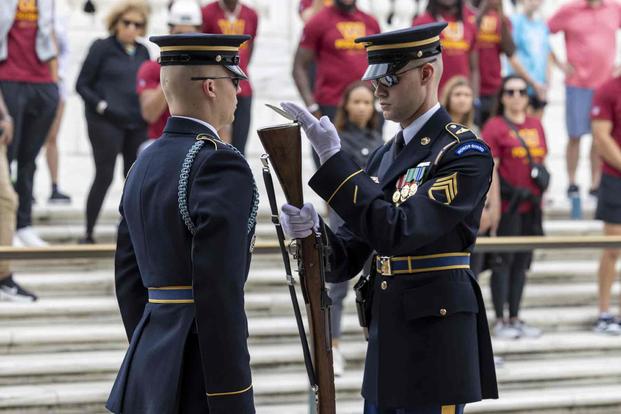Staff Sgt. Stephen Hughes never expected to make a career out of the Army.
Like many soldiers, he joined with the intent of gaining a skill, serving a quick contract, getting out and going to college. It was the same plan some of the service’s most experienced leaders also had.
But he stuck around after what he said was a string of leaders who invested in his professional development. Now, he’s one of the Army’s most successful career counselors, responsible for retaining soldiers and pitching them to continue their service. He was recognized this month as 2023’s top career counselor in the Washington, D.C., area.
Read Next: Cyberattack Against Commercial Prescription Program Hamstrings Military Pharmacies Around the World
“I love it. I get to encourage people to make really good decisions for themselves and their family,” he told Military.com in an interview. “I really have a lot of job satisfaction with that.”
And it seems to be working.
Army units in the Washington, D.C., area are already within striking distance of their retention goals, extending the contracts of 97 soldiers this fiscal year, which began in October. Their goal is to keep 100. Last year, the Military District of Washington, or MDW, got more than 500 soldiers whose contracts were set to expire this year to reenlist.
MDW includes soldiers in the National Capital Region, including northern Virginia and southern Maryland. Most notably, it includes the 3rd Infantry Regiment, or “Old Guard,” the ceremonial unit of Arlington National Cemetery.
The region serves as a microcosm for the Army and can forecast whether the force will hit its ever ambitious retention goals. If the service goes the way of the MDW, it’ll have achieved those goals five years in a row.
Last year, the Army hit its goal to retain 55,000 soldiers who were set to leave the service. The service declined to comment on what its retention goal is this year.
Hitting the mark this year could show that, despite an ongoing recruiting slump, soldiers who do join end up wanting to stay. The Army came up some 10,000 new enlistments short of a goal of 65,000 new active-duty soldiers when the last fiscal year ended in September.
Troops are commonly incentivized with cash bonuses to continue their service, but those bonuses range widely from $5,000 to $90,000 depending on their job and rank. Soldiers also sometimes have the option to negotiate a career field or duty station, or choose to stay at their current base.
The top reason soldiers want to continue their Army career is retirement pay, which troops typically can earn after 20 years of service, according to data from the service. Soldiers also continue their careers for a sense of purpose, career stability and other benefits such as health care.
The reasons many soldiers decide to leave are the effects service has on their families and other personal relationships, work-life balance and morale.
A Military.com review of deployment data found that soldiers are away from home now more than ever, even more so than during the peak of the wars in Iraq and Afghanistan. In an interview with Military.com in October, Army Secretary Christine Wormuth said service planners were looking into ways to take things off soldiers’ plates, an effort that could be blunted as a smaller force takes on increasingly large mission loads.
Meanwhile, the Army National Guard has the opposite problem. It missed its retention goal, though barely, last year after reenlisting 36,000 soldiers, coming up 1,000 short. It also failed to hit its recruiting goal last year, but came up short only by about 5% of its goal of signing up 30,880 part-time soldiers, bringing in 29,457.
Related: Inside the Army’s Mad Dash for Recruiters After Graduating Only Half the Number Needed
Story Continues
Please rate this CIBA article
Vote






